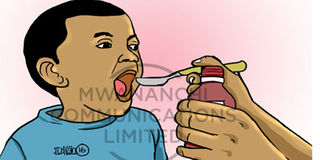PARENTING : Medicines you shouldn’t give your child

What you need to know:
Never give your child aspirin or any medication containing aspirin unless instructed to do so by your child’s doctor. Aspirin can make a child susceptible to Reye’s syndrome – a rare but potentially fatal illness. Read labels carefully (aspirin is sometimes referred to as “salicylate” or “acetylsalicylic acid”), and ask your doctor or pharmacist if you’re not sure whether a product contains aspirin.
Young children are much more likely than adults to have adverse drug reactions, so giving your child prescription or over-the-counter (OTC) medication – even “herbal” medicines – is serious business. Here are some medicines you should never give your 2- to 4-year-old.
Aspirin: Never give your child aspirin or any medication containing aspirin unless instructed to do so by your child’s doctor. Aspirin can make a child susceptible to Reye’s syndrome – a rare but potentially fatal illness. Read labels carefully (aspirin is sometimes referred to as “salicylate” or “acetylsalicylic acid”), and ask your doctor or pharmacist if you’re not sure whether a product contains aspirin.
For fever and other discomfort, you may want to give your child acetaminophen or ibuprofen (make sure the dosage is correct). However, if your child is dehydrated or vomiting or has asthma, kidney problems, an ulcer, or another long-term illness, talk to your doctor before giving ibuprofen. Also talk with your doctor about an alternative to acetaminophen if your child has liver disease.
Over-the-counter cough and cold medicines: Health experts advise against giving OTC cough and cold medicines to preschool-age children. Studies show that they don’t actually help soothe symptoms in kids this age. And they can be harmful, especially when a child mistakenly gets more than the recommended dose.
In addition to side effects like drowsiness or sleeplessness, upset stomach, and a rash or hives, a child can suffer serious effects such as rapid heart rate, convulsions, and even death. If your child is miserable with a cold, you may want to try a humidifier or other home remedies.
Anti-nausea medications: Don’t give your child a prescription or OTC anti-nausea medication unless his doctor specifically recommends it. Most bouts of vomiting are pretty short-lived, and children usually handle them just fine without any medication. In addition, anti-nausea medications have risks and possible complications.
Infant and adult medications: Giving your child a smaller dose of medicine meant for an adult is as dangerous as giving a higher dose of medicine meant for an infant. Many parents don’t realise that infant drops are more concentrated than liquid medicine intended for older children. If the label doesn’t indicate an appropriate dose for the weight and age of your child, don’t give that medication to your preschooler.
Any medication prescribed for someone else or for another condition. Prescription drugs intended for other people (like a sibling) or to treat other illnesses may be ineffective or even dangerous when given to your child. Give her only medicine prescribed for her and her specific condition.
Anything expired: Toss out medicines, prescription and OTC alike, as soon as they expire. Also get rid of discoloured or crumbly medicines – basically anything that doesn’t look the way it did when you bought it, after the use-by date, medications may no longer be effective and can even be harmful.
In general, it’s not a good idea to flush old drugs down the toilet, as they may contaminate groundwater and end up in the drinking water supply. But a few drugs are so potentially harmful to children that it is recommended they should be disposed of in the toilet rather than the trash.
Don’t crush tablets or capsules when you mix the medicine with the undesirable substance. Remove any personal information from the empty bottle before disposing it alongside the sealed container of medicine in the trash.
Extra acetaminophen: Some medicines contain acetaminophen to help ease fever and pain, so be careful not to give your child an additional separate dose of acetaminophen if he’s taking such medications. If you’re not sure what’s in a particular medicine, don’t give him acetaminophen or ibuprofen until you’ve first gotten the okay from your doctor or pharmacist.
Syrup of ipecac: Syrup of ipecac causes vomiting and is used to be kept handy to prevent poisoning. The American Academy of Pediatrics says the best way to prevent accidental poisoning is to keep potentially harmful substances locked up and out of sight.
Email: [email protected]




